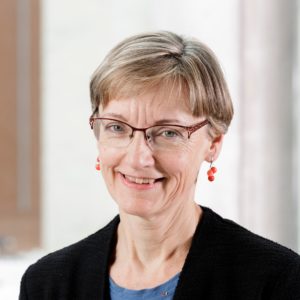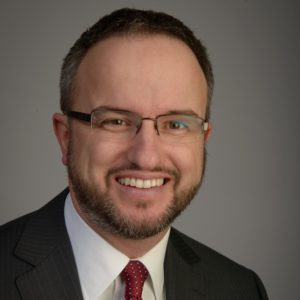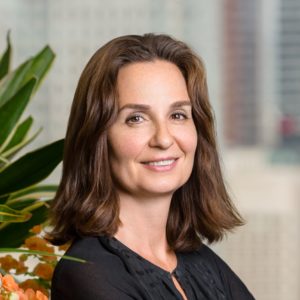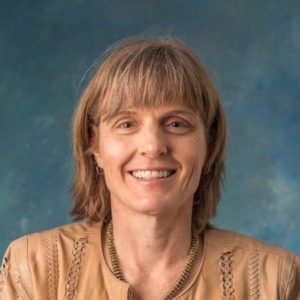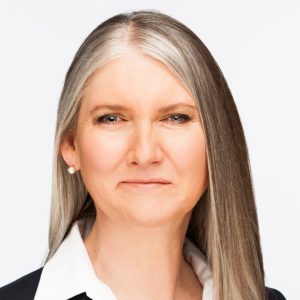Making Connections 2018: Speaker bios
Keynote speaker
Maggie MacDonnell
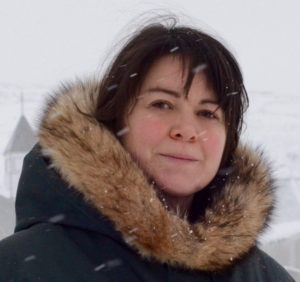 Maggie MacDonnell is the winner of the Global Teacher Prize, a $1 Million US award considered to be the Nobel Peace Prize of Education. She was chosen from over 20,000 nominees in 179 countries. Her work has spanned diverse communities and populations – including working with; Congolese and Burundian refugees, young Tanzanians living with HIV/AIDS, to Indigenous Inuit living in the Canadian Arctic. She brings a community development approach to her teaching styles and cares deeply about removing gendered barriers in the class, to exploring how education can be used to “de-colonize”. She loves movement and using physical activity as a tool to engage with youth.
Maggie MacDonnell is the winner of the Global Teacher Prize, a $1 Million US award considered to be the Nobel Peace Prize of Education. She was chosen from over 20,000 nominees in 179 countries. Her work has spanned diverse communities and populations – including working with; Congolese and Burundian refugees, young Tanzanians living with HIV/AIDS, to Indigenous Inuit living in the Canadian Arctic. She brings a community development approach to her teaching styles and cares deeply about removing gendered barriers in the class, to exploring how education can be used to “de-colonize”. She loves movement and using physical activity as a tool to engage with youth.
Maggie on public education:
“The Canadian public education system was a powerful tool used to inflict horrific levels of abuse on Indigenous peoples for generations, as well as keeping many non-Indigenous Canadians ignorant and misinformed of their country’s history and the plight of their fellow citizens. Under the nation’s current narrative of reconciliation, I am anxious to see if and how public education will redeem itself.”
Plenary Panel: Changing the way we think about equity
Renu Mandhane
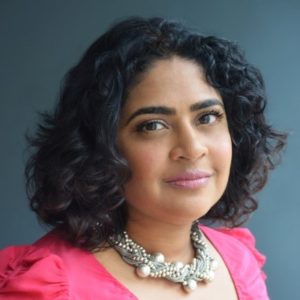
Renu Mandhane was appointed Chief Commissioner of the Ontario Human Rights Commission in October 2015. She is the former Executive Director of the award-winning International Human Rights Program at the University of Toronto, Faculty of Law. She has an LL.M in international human rights law from New York University. Renu began her practice focused on criminal law, and in that capacity she represented many survivors of sexual violence and prisoners. Renu sits on the Canada Committee of Human Rights Watch, and has appeared before the Supreme Court of Canada and the United Nations. Most recently, Renu was recognized by Canadian Lawyer magazine as one of Canada’s most influential lawyers for her advocacy related to solitary confinement.
Renu on public education:
“Ontario’s education system views disability as an anomaly to normalcy rather than an inherent and expected variation in the human condition. At an impressionable age, students with disabilities learn that they are not “normal,” they will have to navigate adversarial and bureaucratic processes just to be included, and there is always a looming risk they will be excluded from mainstream society altogether. Our new Policy and recommendations on accessible education for students with disabilities lays out a foundation for inclusive and welcoming schools. An estimated 94% of Ontario children attend public school. For most, it is their first interaction with a government institution or system, and it sets the tone for their engagement in broader society. We have a tremendous opportunity to do better.”
Website: ohrc.on.ca
Twitter: @RenuMandhane
Elizabeth McIsaac
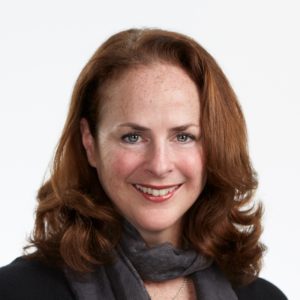
Elizabeth is the president of Maytree, which is working to advance the discussion around poverty and human rights in Canada. She is a dedicated builder and champion for the non-profit sector, with extensive experience in research, teaching, and direct service provision. Elizabeth has a deep history with Maytree; she previously served as the Director of Policy and was the executive director of one of Maytree’s signature ideas: the Toronto Region Immigrant Employment Council (TRIEC). Most recently, Elizabeth established and led Mowat NFP (Not-for-Profit Policy) at the Mowat Centre, where she conducted and directed research analyzing the challenges facing the non-profit sector today. Elizabeth holds an MA in Sociology in Education from the University of Toronto – Ontario Institute for Studies in Education.
Elizabeth on public education:
“Too often, the right to education is understood as an issue facing individuals and communities in the global South. We think about a lack of schools, teachers or textbooks, or unequal access to schools for girls and young women in the developing world, but not about the realization of the right to education at home. By framing education as a fundamental human right in our own context of an advanced economy, we place the emphasis on education for all without discrimination; the obligation of states to protect, respect and fulfil this right; and the need for accountability mechanisms when people cannot realize their right.”
Website: maytree.com
Twitter: @maytree_canada
Cyril Cromwell
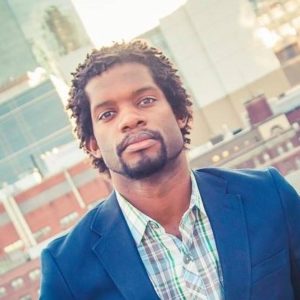 Cyril is a community educator, researcher, and currently the Learning & Development manager for the Youth Research & Evaluation eXchange. As a community educator and former front-line youth worker, Cyril has presented leadership and media workshops in communities, schools and open custody detention centres. As a PhD candidate, Cyril is passionate about researching the contradictions that are discreetly embedded within the social service sector and exploring how subtle systemic (power) structuring may be undermining well-meaning and even charitable interventions/intentions. As a learning manager and consultant, Cyril has supported the development and implementation of online and in-person trainings across Ontario for youth workers and public servants, to build capacity and create space for critical dialogue.
Cyril is a community educator, researcher, and currently the Learning & Development manager for the Youth Research & Evaluation eXchange. As a community educator and former front-line youth worker, Cyril has presented leadership and media workshops in communities, schools and open custody detention centres. As a PhD candidate, Cyril is passionate about researching the contradictions that are discreetly embedded within the social service sector and exploring how subtle systemic (power) structuring may be undermining well-meaning and even charitable interventions/intentions. As a learning manager and consultant, Cyril has supported the development and implementation of online and in-person trainings across Ontario for youth workers and public servants, to build capacity and create space for critical dialogue.
Patrick Case
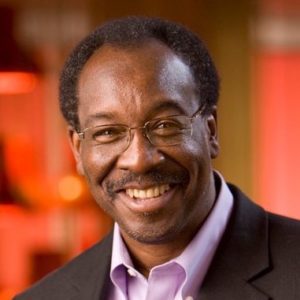 Patrick Case, LSM, LL.B., LL.M. is the Assistant Deputy Minister and Chief Equity Officer in the Education Equity Secretariat of the Ministry of Education. Case was most recently an assistant professor in the Department of Political Science at the University of Guelph. He is an adjunct professor at Osgoode Hall Law School and director of the Osgoode Hall Law School Certificate Program in Human Rights Theory and Practice.
Patrick Case, LSM, LL.B., LL.M. is the Assistant Deputy Minister and Chief Equity Officer in the Education Equity Secretariat of the Ministry of Education. Case was most recently an assistant professor in the Department of Political Science at the University of Guelph. He is an adjunct professor at Osgoode Hall Law School and director of the Osgoode Hall Law School Certificate Program in Human Rights Theory and Practice.
Shree Paradkar – Moderator
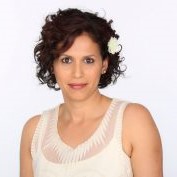
Shree Paradkar is the Atkinson Fellow for 2018-2019, examining the urgent topic of equitable education. She is also the Toronto Star’s Race and Gender Columnist tackling issues of discrimination and identity. Shree is the author of Betrayed: My cousin’s wrongful conviction for the murder of her daughter, Aarushi. She is an international journalist who has worked in leading newsrooms in Toronto, Singapore, Bangalore and Mumbai.
Shree on public education:
If Canadians value equality, fairness, respect and justice, we need to take a long, hard and continuous look at our education system. A few questions we need to reflect upon: Are we closet segregationists? Do we believe everybody is educable? What are we doing to interrupt the use of education as a tool to produce corporate cogs? What does power sharing in a decolonized system look like?
Twitter: @shreeparadkar
Session AM1: Everything I need to know I learned in early childhood education
Lois Mahon
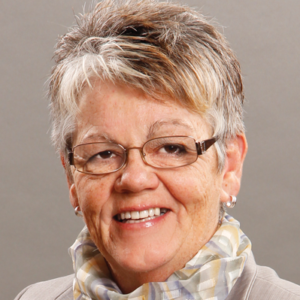
Lois is proud to be a Registered Early Childhood Educator. Awarded the Andrew Fleck Services award for the “100 most influential people in child care”, she is a pioneer in the children’s services industry, and continues to work diligently in her advocacy for quality, accessible child care. As the founding president of the College of Early Childhood Educators, Lois understands the importance of self-regulation as a significant component of early learning and care. She travels the province – training, guiding, and supporting leadership in the sector and development of a quality system. Lois was also the founding Executive Director of Child and Family Resources, a multi service agency in northern Ontario.
Lois on public education:
“Quality accessible early childhood education sets a solid foundation for future success both in school and in life.”
Magdalena Janus
Magdalena Janus has a PhD in behavioural sciences from Cambridge University, UK. She is a Professor at the McMaster University’s Department of Psychiatry and Behavioural Neurosciences and the Offord Centre for Child Studies, where she holds the Ontario Chair in Early Child Development. With the late Dr. Dan Offord, Magdalena co-developed the Early Development Instrument (EDI), a measure of children’s readiness to learn at school entry. Since then, Magdalena and her team led the implementation of the EDI in Canada – which has now surpassed 1 million children, garnered the support of governments across the country, and created a data source on early child development widely used by communities, educators, and researchers. The EDI has been adapted for use in a number of countries, most notably in Australia, where it is also conducted on a national scale. Magdalena regularly serves as a consultant with various national and international organizations, such as the World Bank, WHO, and UNICEF, on the measurement and indicators of early child development. Magdalena’s research interests include social determinants of children’s health, transition to school, with a particular emphasis on children with special needs, and communities’ engagement in children’s early development and health. She collaborates with Canadian and international colleagues on a number of research projects in these areas, and enjoys teaching and supervising students.
Magdalena on public education:
“Without public education there is no hope of equity. Free, accessible, high quality public education and public health are indispensable steps towards achieving a civil society.”
Website: www.edi.offordcentre.com
Twitter: @EDI_OCCS
Session AM2: 15,000 years of well-being education!
Pamela Toulouse
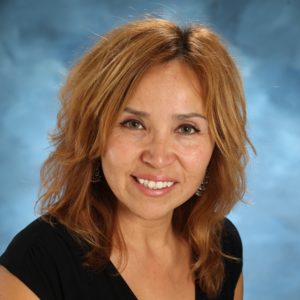 Dr. Pamela Rose Toulouse is an Associate Professor in the Faculty of Education at Laurentian University. Her areas of specialty are inclusive education, classroom management, lesson planning, learning cycles, assessment/evaluation, technology, differentiated instruction, Indigenous Education and social justice collaborations. She is a National 3M Teaching Excellence Award Fellow and has been cited in Maclean’s magazine as one of LU’s favourite professors. Originally from the community of Sagamok First Nation, Dr. Toulouse is a proud Ojibwe/Odawa woman that comes from a long line of educators. She is well known for her contributions in Indigenous Education, and has published well over 50 resources, including books, curriculum pieces, articles, and videos. Dr. Toulouse is known for her dynamic teaching, commitment to equity, and passion for education. She works with a variety of school boards, presents regularly, and is active in her areas of research. Dr. Toulouse continues her life journey in the field of education by representing her Nation and profession in a respectful and meaningful way.
Dr. Pamela Rose Toulouse is an Associate Professor in the Faculty of Education at Laurentian University. Her areas of specialty are inclusive education, classroom management, lesson planning, learning cycles, assessment/evaluation, technology, differentiated instruction, Indigenous Education and social justice collaborations. She is a National 3M Teaching Excellence Award Fellow and has been cited in Maclean’s magazine as one of LU’s favourite professors. Originally from the community of Sagamok First Nation, Dr. Toulouse is a proud Ojibwe/Odawa woman that comes from a long line of educators. She is well known for her contributions in Indigenous Education, and has published well over 50 resources, including books, curriculum pieces, articles, and videos. Dr. Toulouse is known for her dynamic teaching, commitment to equity, and passion for education. She works with a variety of school boards, presents regularly, and is active in her areas of research. Dr. Toulouse continues her life journey in the field of education by representing her Nation and profession in a respectful and meaningful way.
Pamela on public education:
“Public education is a microcosm of our society. It is where the politics of truth and reconciliation play out in real time in our classrooms, staff lounges and on the schoolyard. These are the spaces where Indigenous children, youth and communities experience first hand the personal and professional interpretations/opinions about First Peoples lives, worldviews and rights.”
Website: https://laurentian.ca/faculty/ptoulouse
Twitter: @drpamelarose
Session AM3: Beyond the “usual suspects”: connecting with hard-to-reach communities
Kyla Winacott
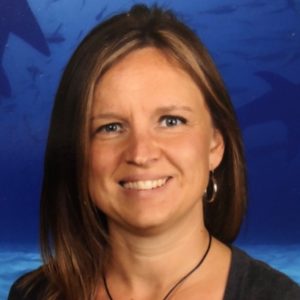 Kyla is the Department head of the Academy of Indigenous Studies at Mount Boucherie Secondary School in West Kelowna, British Columbia, where she also teaches Aboriginal leadership, English First Peoples, and Contemporary Indigenous Studies. She is Cree/Metis, and the recipient of the 2017 EdCan Innovation that Sticks award for ‘reconciliation in action’ to increase the graduation rate of indigenous students. Before becoming an educator, Kyla worked for 18 years as an RCMP dispatcher and worked with at risk youth on the downtown Eastside of Vancouver. Before moving to the Okanagan, Kyla taught in the Dene community of Fort Simpson, NWT.
Kyla is the Department head of the Academy of Indigenous Studies at Mount Boucherie Secondary School in West Kelowna, British Columbia, where she also teaches Aboriginal leadership, English First Peoples, and Contemporary Indigenous Studies. She is Cree/Metis, and the recipient of the 2017 EdCan Innovation that Sticks award for ‘reconciliation in action’ to increase the graduation rate of indigenous students. Before becoming an educator, Kyla worked for 18 years as an RCMP dispatcher and worked with at risk youth on the downtown Eastside of Vancouver. Before moving to the Okanagan, Kyla taught in the Dene community of Fort Simpson, NWT.
Kyla on public education:
“Ideally, school is meant to be a ‘home away from home’, to provide a safe place for all learners to find pride in their ancestry, confidence in their path, and posture for their future. Our children cannot be expected to learn without feeling this sense of belonging and purpose. Indigenous children come from generations of stories being their foundations for learning and keeping culture alive. As Richard Wagamese would say, “we are all just stories in the end.” It is my hope that my ‘story’ as an educator and one who owes her success to those in public education, will inspire others to weave ‘culture as medicine’ into their mainstream curriculum.”
André Rebeiz
 As Research Manager for the EdCan Network (Canadian Education Association), André provides critical analysis to implement a variety of research projects, knowledge tools, and promotional materials to advance evidence-informed and anecdotal good practices from and across the entire spectrum of Canadian K-12 public education. He collaborates with parents, educators, school leaders, researchers, policymakers, and community partners to breakdown complex research and policy so that it can be understood by everyone while generating real impact. André is a former Student Trustee for the York Catholic District School Board and former executive council member of the Ontario Student Trustees’ Association. He holds a Master’s Degree in Public Policy and Management from the Institut d’études politiques de Paris (Sciences Po Paris), in Paris, France. You can catch him every two weeks on the podcast series “EdCan Live Wire” on voicEd Radio.
As Research Manager for the EdCan Network (Canadian Education Association), André provides critical analysis to implement a variety of research projects, knowledge tools, and promotional materials to advance evidence-informed and anecdotal good practices from and across the entire spectrum of Canadian K-12 public education. He collaborates with parents, educators, school leaders, researchers, policymakers, and community partners to breakdown complex research and policy so that it can be understood by everyone while generating real impact. André is a former Student Trustee for the York Catholic District School Board and former executive council member of the Ontario Student Trustees’ Association. He holds a Master’s Degree in Public Policy and Management from the Institut d’études politiques de Paris (Sciences Po Paris), in Paris, France. You can catch him every two weeks on the podcast series “EdCan Live Wire” on voicEd Radio.
André on public education:
“Polarizing debates in public education can, at times, leave us frustrated and confused. That’s why it’s important to listen to all sides, think critically, as well as focus on and question the evidence – if we hope to advance public education to create a better world.”
Website: www.edcan.ca
Twitter: @AndreRebeiz
Nazerah Shaikh
 Nazerah is a parent representative on the Parent Involvement Advisory Committee (PIAC) for the Toronto District School Board (TDSB). Prior to joining the PIAC, she was on the Gateway PS School Council from 2008-2016, and served as Chair for six years. She loves to learn about technology, more specifically about using social media as an effective parent engagement tool, and is eager to share what she’s learned. In November 2016, she joined Haniya Sheikh (PIAC Representative) and Qaiser Ahmad (Assistant Curriculum Leader – Guidance, TDSB) to form the Islamic Heritage Month (IHM) Planning Group. The three Co-Chairs currently lead a team of over 50 parents and educators across Toronto, primarily over social media and digital communication. Through collaboration, they have successfully compiled a 196-page IHM Resource Guidebook for Educators (which includes over 400 items: an educator’s primer; daily morning announcements; books and publications; films and documentaries; curriculum and study guides; writing assignments; art projects; musicians; and a list of speakers, artists and entertainers), created an annual IHM poster, and have hosted a variety of events and learning activities throughout the month of October for parents, students and staff across TDSB.
Nazerah is a parent representative on the Parent Involvement Advisory Committee (PIAC) for the Toronto District School Board (TDSB). Prior to joining the PIAC, she was on the Gateway PS School Council from 2008-2016, and served as Chair for six years. She loves to learn about technology, more specifically about using social media as an effective parent engagement tool, and is eager to share what she’s learned. In November 2016, she joined Haniya Sheikh (PIAC Representative) and Qaiser Ahmad (Assistant Curriculum Leader – Guidance, TDSB) to form the Islamic Heritage Month (IHM) Planning Group. The three Co-Chairs currently lead a team of over 50 parents and educators across Toronto, primarily over social media and digital communication. Through collaboration, they have successfully compiled a 196-page IHM Resource Guidebook for Educators (which includes over 400 items: an educator’s primer; daily morning announcements; books and publications; films and documentaries; curriculum and study guides; writing assignments; art projects; musicians; and a list of speakers, artists and entertainers), created an annual IHM poster, and have hosted a variety of events and learning activities throughout the month of October for parents, students and staff across TDSB.
Nazerah on public education:
“Today my heart swelled. My 4-year old had a micro-meltdown because he couldn’t find his ORANGE t-shirt for “Orange Shirt Day”. I called his aunt’s house and learned very quickly from the noise in the background that my niece and nephew were upset and protesting going to school because they too couldn’t find their ORANGE t-shirts…Our leaders are doing their jobs. Our teachers are doing their jobs. Reconciliation is a long, hard road, but I’m proud to be led in the right direction by our kids. This is public education. The journey is tough, but it builds you up.”
Twitter: @nazerah99
Session AM4: Let’s focus on mental health, not mental illness
Christine Preece
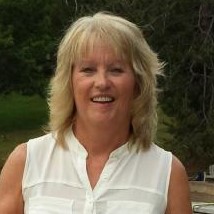 Christine Preece has over 25 years of experience working in the health and education sector. She is the Mental Health and Wellbeing Systems Lead for the St. Clair Catholic District School Board, and is the Co-Chair of the Ontario Healthy Schools Coalition, an Ontario-wide, broad-based coalition, with members from public health units, school boards, hospitals, mental health agencies, universities, health-related organizations, education-related organizations, and parent and student organizations. She is also a member of the healthy schools advisory committee for Physical and Health Education Canada. Christine previously worked as a Manager of the Young Adult Team at the Middlesex London Health Unit. In this role, she was team leader for nurses, dietitians and health promoters in facilitating the development, implementation and evaluation of school health initiatives. Christine has a Masters of Health Studies degree focused on holistic health, and has applied much of her learnings to her daily work. She is also an experienced practitioner in the area of youth engagement. In 2017, Christine obtained her Masters of Certified Health Education Specialist. Christine believes that holistic health is foundational to student learning.
Christine Preece has over 25 years of experience working in the health and education sector. She is the Mental Health and Wellbeing Systems Lead for the St. Clair Catholic District School Board, and is the Co-Chair of the Ontario Healthy Schools Coalition, an Ontario-wide, broad-based coalition, with members from public health units, school boards, hospitals, mental health agencies, universities, health-related organizations, education-related organizations, and parent and student organizations. She is also a member of the healthy schools advisory committee for Physical and Health Education Canada. Christine previously worked as a Manager of the Young Adult Team at the Middlesex London Health Unit. In this role, she was team leader for nurses, dietitians and health promoters in facilitating the development, implementation and evaluation of school health initiatives. Christine has a Masters of Health Studies degree focused on holistic health, and has applied much of her learnings to her daily work. She is also an experienced practitioner in the area of youth engagement. In 2017, Christine obtained her Masters of Certified Health Education Specialist. Christine believes that holistic health is foundational to student learning.
Christine on public education:
“Education is knowledge and knowledge is power. Having public education that is provided to people from all walks of life, regardless of their background, gender, culture or beliefs, is essential for developing a healthy society. Those that do not have a chance to receive quality education during their childhood and teen years are less likely to succeed in their adult life. Ontario has one of the best public education systems in the world and my hope is that the strategies that have made this happen will continue for years to come.”
Session AM5: Navigating post-secondary education
Sean Reid
Sean is the Vice-president and Regional Director (Ontario) of the Progressive Contractors Association of Canada. He has worked for over 20 years with senior business and government leaders in the research, development and communication of public policy and strategy. Prior to joining PCA, Sean served as Senior Researcher at Cardus, a leading Canadian public policy firm in the area of construction, labour and industrial relations. In his career, Sean has also served as principal speechwriter and communications advisor to a senior Federal cabinet minister and as a communications consultant for several Canadian cabinet ministers and legislators.
Website: www.pcac.ca
Twitter: @SCReid_1973
Fiona Deller
Fiona Deller guides HEQCO’s research and policy agendas. Prior to joining HEQCO, she was the postsecondary education coordinator at the Council of Ministers of Education, Canada. Fiona has worked for the provincial and the federal governments in postsecondary-related positions, including student assistance and quality assurance. She held advocacy positions with the Federation of Canadian Municipalities and the Canadian Alliance of Student Associations. She has her PhD from OISE/University of Toronto in theory and policy of higher education and teaches at Ryerson in the Department of Politics and Public Administration.
Website: www.heqco.ca
Twitter: @fmdeller
Cathy Campbell
Cathy Campbell has over 20 years experience as a researcher, career counselor, program developer and manager in high school, community college, university, and government settings. She has extensive experience at both a client and program level in helping young adults make effective transition into post-secondary education and the workplace. Cathy has presented and published on the topics of narrative career counseling, effective roles for parents role in assisting young people with career planning, and chaos-oriented approaches to career counseling. She has completed a PhD and released the CERIC-funded publication Career Crafting the Decade After High School which is based on her doctoral research.
Session PM1: Defining success: Views from the next generation
Amal Qayum
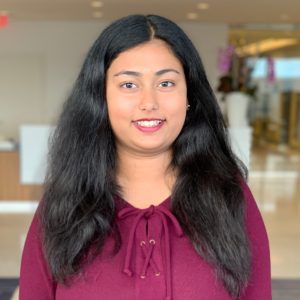 Amal Qayum is a grade 12 student at Westlane Secondary School in Niagara Falls. She is serving her second term as a Student Trustee for the District School Board of Niagara, and is the President of OSTA-AECO. Amal has always been passionate about education and believes that regardless of social, economic or personal circumstances, everyone should have access to quality education. Her involvement in student leadership began at an early age, having been a member of various student councils since grade 4. She has been the President of her school’s multicultural club, coordinated initiatives with the Niagara Falls Mayor’s Youth Advisory Committee, was a member of the National Youth Advisory Committee, and serves as the student liaison for the Education Foundation of Niagara. Amal is the recipient of the Hope Awards from Pathstones, and a two-time recipient of the Niagara Falls Rotary Club “Service above Self” award. Amal feels very fortunate to have been elected as the President of OSTA-AECO and looks forward to advocating for students at a provincial level. Although Ontario has one of the best education systems in the world, Amal knows that there is more work to be done and strongly believes that students are the best critics of their own system. She eagerly anticipates working with other education stakeholders and providing Ontario students with the best education system possible.
Amal Qayum is a grade 12 student at Westlane Secondary School in Niagara Falls. She is serving her second term as a Student Trustee for the District School Board of Niagara, and is the President of OSTA-AECO. Amal has always been passionate about education and believes that regardless of social, economic or personal circumstances, everyone should have access to quality education. Her involvement in student leadership began at an early age, having been a member of various student councils since grade 4. She has been the President of her school’s multicultural club, coordinated initiatives with the Niagara Falls Mayor’s Youth Advisory Committee, was a member of the National Youth Advisory Committee, and serves as the student liaison for the Education Foundation of Niagara. Amal is the recipient of the Hope Awards from Pathstones, and a two-time recipient of the Niagara Falls Rotary Club “Service above Self” award. Amal feels very fortunate to have been elected as the President of OSTA-AECO and looks forward to advocating for students at a provincial level. Although Ontario has one of the best education systems in the world, Amal knows that there is more work to be done and strongly believes that students are the best critics of their own system. She eagerly anticipates working with other education stakeholders and providing Ontario students with the best education system possible.
Amal on public education:
“All students regardless of social, economic or personal circumstances, should have access to quality education.”
Website: www.osta-aeco.org
Herleen Arora
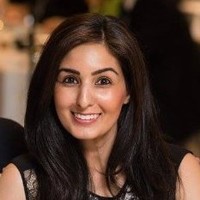 Herleen Arora (She/Her) is a Career Educator at Ryerson University, Researcher/Consultant, and Co-Founder of Womxn Offering Wisdom. She is a member of People for Education’s NextGen Committee, and is an Ontario Certified Teacher with a Masters of Education in Social Justice from OISE, and a Bachelor of Health Sciences from Western University. Herleen has over ten years of experience in the non-profit and education sector where she has managed and coordinated projects focusing on education, employment and community health across the GTA with organizations such as CivicAction, York Region District School Board, Peel Counts, and the YMCA. In her role at Ryerson, she designs and delivers career education programming and resources that meet the unique needs of students in the Faculty of Community Services and the labour market. As a Researcher and Consultant, Herleen’s expertise lies in planning, implementing and evaluating community-based projects, engaging multiple stakeholders, data and measurement, and evidence-based research. She is a champion for improving the economic and social well-being of marginalized communities, and recently co-founded Womxn Offering Wisdom, a grassroots organization dedicated to supporting the health and well-being of diverse South Asian Womxn through coaching, mentorship, and education. In all her work, Herleen applies a systems thinking approach, which enables her to analyze complex social issues with a holistic, multi-layered lens.
Herleen Arora (She/Her) is a Career Educator at Ryerson University, Researcher/Consultant, and Co-Founder of Womxn Offering Wisdom. She is a member of People for Education’s NextGen Committee, and is an Ontario Certified Teacher with a Masters of Education in Social Justice from OISE, and a Bachelor of Health Sciences from Western University. Herleen has over ten years of experience in the non-profit and education sector where she has managed and coordinated projects focusing on education, employment and community health across the GTA with organizations such as CivicAction, York Region District School Board, Peel Counts, and the YMCA. In her role at Ryerson, she designs and delivers career education programming and resources that meet the unique needs of students in the Faculty of Community Services and the labour market. As a Researcher and Consultant, Herleen’s expertise lies in planning, implementing and evaluating community-based projects, engaging multiple stakeholders, data and measurement, and evidence-based research. She is a champion for improving the economic and social well-being of marginalized communities, and recently co-founded Womxn Offering Wisdom, a grassroots organization dedicated to supporting the health and well-being of diverse South Asian Womxn through coaching, mentorship, and education. In all her work, Herleen applies a systems thinking approach, which enables her to analyze complex social issues with a holistic, multi-layered lens.
Herleen on public education:
“Public education is complex and requires diverse schools of thoughts, leadership and experiences to lead an education system that connects with student’s identities, lived experiences, and communities.”
Twitter: @HerleenArora
Gerri Nakirigya Lutaaya
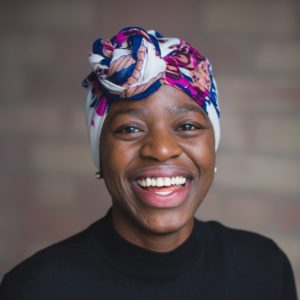 Gerri Nakirigya Lutaaya belongs to the Ngonge clan within the Buganda kingdom, and is a member of People for Education’s NextGen Committee. Through her combined academic, professional and lived experience, Gerri maintains a spirited zest for the importance, and power, of education for young people because of its potential to spark action, impact and change on society’s most pressing issues. A graduate of Carleton University’s Master of Philanthropy and Nonprofit Leadership program, Gerri is committed to Nelson Mandela’s challenge that “a degree means nothing unless you go out into the community to prove yourself.” She also holds a Certificate in Fundraising Management from Algonquin College and was a 2016 Inclusion and Philanthropy Fellow through the AFP Foundation for Philanthropy – Canada where she gained current inclusion-oriented education and training on diversity and inclusion practices for the workplace. In addition to her focus on building awareness and strengthening relations between Indigenous and non-Indigenous peoples, Gerri works closely with CivicAction’s Emerging Leaders Network and is a Board Member with the Young Women’s Leadership Network.
Gerri Nakirigya Lutaaya belongs to the Ngonge clan within the Buganda kingdom, and is a member of People for Education’s NextGen Committee. Through her combined academic, professional and lived experience, Gerri maintains a spirited zest for the importance, and power, of education for young people because of its potential to spark action, impact and change on society’s most pressing issues. A graduate of Carleton University’s Master of Philanthropy and Nonprofit Leadership program, Gerri is committed to Nelson Mandela’s challenge that “a degree means nothing unless you go out into the community to prove yourself.” She also holds a Certificate in Fundraising Management from Algonquin College and was a 2016 Inclusion and Philanthropy Fellow through the AFP Foundation for Philanthropy – Canada where she gained current inclusion-oriented education and training on diversity and inclusion practices for the workplace. In addition to her focus on building awareness and strengthening relations between Indigenous and non-Indigenous peoples, Gerri works closely with CivicAction’s Emerging Leaders Network and is a Board Member with the Young Women’s Leadership Network.
Gerri on public education:
“To me, this quote from Mary McLeod Bethune captures why public education is important: ‘We have a powerful potential in our youth, and we must have the courage to change old ideas and practices so that we may direct their power toward good ends.’”
Twitter: @gerrilutaaya
Kherto Ahmed
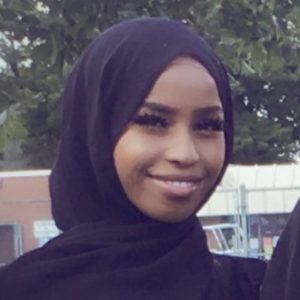 Kherto is a second-year life science student at McMaster University and student researcher at Success Beyond Limits. She is always looking to positively change her community, and believes in leading the younger generation onto a positive path by helping youth academically, socially, and emotionally. Kherto is a huge advocate for doing what you love, and her passion lies in the strengthening of her community. She believes change starts with youth, and involving them in programs and clubs is one of the best ways to create a relationship with them. In high school, Kherto was involved in many clubs and activities, including Success Beyond Limits, a youth program that encourages healthy relationships and academics, and Generation Change, which planned community events such as toy drives and barbecues. Now that she is in university, she is continuing to grow as a leader and work to be a positive influence on youth. She is a member of the “Smiling over Sickness” committee, which gives her the opportunity to build relationships with the patients in the McMaster Children’s Hospital, and the McMaster Global Medical Brigades, which supports under-served rural areas by treating patients and improving their water, sanitation and economic support.
Kherto is a second-year life science student at McMaster University and student researcher at Success Beyond Limits. She is always looking to positively change her community, and believes in leading the younger generation onto a positive path by helping youth academically, socially, and emotionally. Kherto is a huge advocate for doing what you love, and her passion lies in the strengthening of her community. She believes change starts with youth, and involving them in programs and clubs is one of the best ways to create a relationship with them. In high school, Kherto was involved in many clubs and activities, including Success Beyond Limits, a youth program that encourages healthy relationships and academics, and Generation Change, which planned community events such as toy drives and barbecues. Now that she is in university, she is continuing to grow as a leader and work to be a positive influence on youth. She is a member of the “Smiling over Sickness” committee, which gives her the opportunity to build relationships with the patients in the McMaster Children’s Hospital, and the McMaster Global Medical Brigades, which supports under-served rural areas by treating patients and improving their water, sanitation and economic support.
Kherto on public education:
“I believe that in order to succeed, we must be willing to make mistakes so we can learn from them. I believe change begins with the youth in our generation, and including them in programs and clubs is one of the best ways to create a healthy relationship with them.”
Session PM2: Inventing a new report card for the 21st century
Liz Rykert, Facilitator
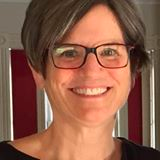 Liz Rykert is a strategist, facilitator and network weaver. She tends to focus on system level challenges, helping people engage to find new solutions. She is the past president of Meta Strategies and, since January of this year, she has had a focus on working less and supporting people in the Toronto area to learn and apply Liberating Structures. In her final year at Meta Strategies she led the Enhancing Equity Task Force for the Toronto District School Board.
Liz Rykert is a strategist, facilitator and network weaver. She tends to focus on system level challenges, helping people engage to find new solutions. She is the past president of Meta Strategies and, since January of this year, she has had a focus on working less and supporting people in the Toronto area to learn and apply Liberating Structures. In her final year at Meta Strategies she led the Enhancing Equity Task Force for the Toronto District School Board.
Liz on public education:
“Public Education is the bedrock of democracy. It prepares us all to stand up for what is right.”
Twitter: @lizrykert
Teresa Downs
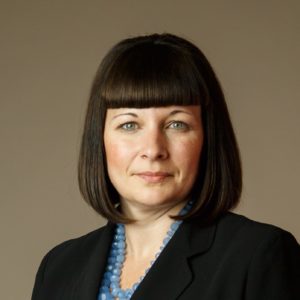 Teresa Downs is Superintendent of Schools of Gold Trail School District (No. 74). Teresa has spent her entire career in the Gold Trail district. She started as a student teacher and then moved to teacher on call, classroom teacher, principal and director of instruction. Gold Trail school district is a rural district that serves 7 geographically dispersed communities. The school district lies on the Secwepemc, St’at’imc and Nlaka’pumux nations, there are 19 bands within these nations. Sixty percent of the 1300 student population is of Indigenous ancestry.
Teresa Downs is Superintendent of Schools of Gold Trail School District (No. 74). Teresa has spent her entire career in the Gold Trail district. She started as a student teacher and then moved to teacher on call, classroom teacher, principal and director of instruction. Gold Trail school district is a rural district that serves 7 geographically dispersed communities. The school district lies on the Secwepemc, St’at’imc and Nlaka’pumux nations, there are 19 bands within these nations. Sixty percent of the 1300 student population is of Indigenous ancestry.
Teresa on public education:
“Public education serves so many critical purposes to a thoughtful and democratic society, I think one of the most important purposes is for students to learn and value the strengths and differences of each individual around them and how those strengths and differences make each classrooms, schools, communities and society stronger.”
Twitter: @DownsTeresa
Joanne Myers
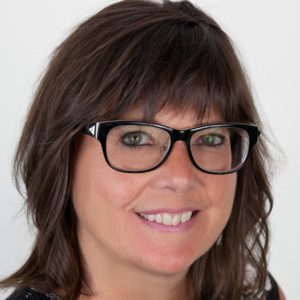 Joanne recently retired from the executive staff in the Professional Learning/Curriculum Services Department at the Elementary Teachers’ Federation of Ontario. At ETFO, she was the staff representative for assessment and reporting. She was also an active member of the Ontario Ministry of Education’s Assessment and Advisory Group. At ETFO, she organized the Classroom Assessment That Works series, the Inspire and Inquire workshop series, Professional Learning Chair Training, Intermediate Conferences, and Financial Management Conferences. She also coordinated the curriculum-based Summer Academy courses with her ETFO colleagues. She recently developed an ETFO assessment website and was a co-writer for the book titled I am the Teacher. Joanne has presented at educational leadership conferences in Ireland and Germany over the past two years, and has just returned from Ireland again, where she delivered a keynote about Teacher Professional Judgement and Collaborative Professionalism. She continues to be a facilitator for the Teacher Leadership and Learning Program with the Ontario Teacher’s Federation and the Ontario Ministry of Education. Prior to her position at ETFO, Joanne taught in the York Region District School Board, and taught courses at OISE/UT for over 15 years. She has instructed AQ courses for OISE/UT in Denmark, Norway, and Sweden. She enjoys sharing her passion for teaching and learning with educators across the province.
Joanne recently retired from the executive staff in the Professional Learning/Curriculum Services Department at the Elementary Teachers’ Federation of Ontario. At ETFO, she was the staff representative for assessment and reporting. She was also an active member of the Ontario Ministry of Education’s Assessment and Advisory Group. At ETFO, she organized the Classroom Assessment That Works series, the Inspire and Inquire workshop series, Professional Learning Chair Training, Intermediate Conferences, and Financial Management Conferences. She also coordinated the curriculum-based Summer Academy courses with her ETFO colleagues. She recently developed an ETFO assessment website and was a co-writer for the book titled I am the Teacher. Joanne has presented at educational leadership conferences in Ireland and Germany over the past two years, and has just returned from Ireland again, where she delivered a keynote about Teacher Professional Judgement and Collaborative Professionalism. She continues to be a facilitator for the Teacher Leadership and Learning Program with the Ontario Teacher’s Federation and the Ontario Ministry of Education. Prior to her position at ETFO, Joanne taught in the York Region District School Board, and taught courses at OISE/UT for over 15 years. She has instructed AQ courses for OISE/UT in Denmark, Norway, and Sweden. She enjoys sharing her passion for teaching and learning with educators across the province.
Joanne on public education:
“Today’s educators continue to be lifelong learners and strive to meet the daily needs of their individual students within their school communities. Through their leadership, dedication, and professional partnerships with stakeholder groups, they continue to take public education to an even higher level. Public education in Ontario is renowned internationally thanks to this collaboration and teachers’ professional judgement.”
Session PM3: Let’s talk about race
Naeem Siddiq
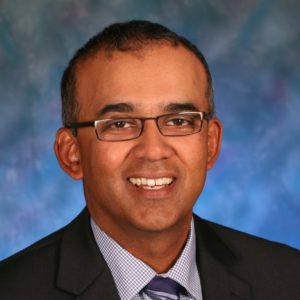 Naeem currently works as consultant with the Ontario Principals’ Council, where he is part of a team that supports principals and vice-principals in both the elementary and secondary panels in the public education system throughout the province. Previously, Naeem served as a secondary school principal in the Toronto District School Board, and as the president of the Ontario Principals’ Council in 2011/12. Naeem has always been an advocate for students in our system, particularly those who are disadvantaged. He served a term on the Minister’s Reference group, as well as a other committees, both provincially and at the district level. When not working, he is actively involved with community baseball and hockey serving as a coach and as an organizer.
Naeem currently works as consultant with the Ontario Principals’ Council, where he is part of a team that supports principals and vice-principals in both the elementary and secondary panels in the public education system throughout the province. Previously, Naeem served as a secondary school principal in the Toronto District School Board, and as the president of the Ontario Principals’ Council in 2011/12. Naeem has always been an advocate for students in our system, particularly those who are disadvantaged. He served a term on the Minister’s Reference group, as well as a other committees, both provincially and at the district level. When not working, he is actively involved with community baseball and hockey serving as a coach and as an organizer.
Naeem on public education:
“My parents choose this country because of their respect for its public education system. They believed that while they would potentially struggle to make their way in a new country, they were comforted in knowing that the quality of their children’s education would not suffer.”
Mante Molepo
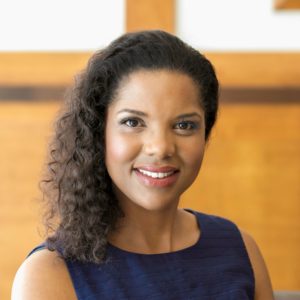 Mante Molepo is a parent, advocate, and lawyer. She is a founding member of Parents for Diversity, a collective of parents committed to achieving inclusive and non-discriminatory learning environments. As the mother of two young children who have experienced racism in school, Mante wants to change the conversation on race and equity in the education system to enable a more constructive dialogue that fosters diversity and inclusive learning environments. Parents for Diversity develops workshops that explore how educators and parents can take meaningful steps to address and eradicate discrimination and bias. Mante has been honoured as one of Canada’s 100 Accomplished Black Women for her contributions to advocating for diversity in the education system.
Mante Molepo is a parent, advocate, and lawyer. She is a founding member of Parents for Diversity, a collective of parents committed to achieving inclusive and non-discriminatory learning environments. As the mother of two young children who have experienced racism in school, Mante wants to change the conversation on race and equity in the education system to enable a more constructive dialogue that fosters diversity and inclusive learning environments. Parents for Diversity develops workshops that explore how educators and parents can take meaningful steps to address and eradicate discrimination and bias. Mante has been honoured as one of Canada’s 100 Accomplished Black Women for her contributions to advocating for diversity in the education system.
Mante on public education:
“Public education has had a tremendous impact on who I am today. From my elementary teachers to university professors, who have taught me to see the world through a critical lens, I have learned to dissect information from an informed and objective perspective. A public education system is one that celebrates diversity and inclusion, by instilling in students a desire for truth and an awareness of humanity that is focused on informed dialogue and engagement.”
Website: www.parentsfordiversity.com
Twitter: @Parents4Divers1
Aakriti Kapoor
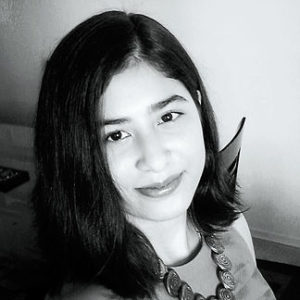 Aakriti Kapoor is the Administrative and Research Coordinator at People for Education. She is an educator and researcher interested in twenty-first century learning, social justice, and global citizenship. She formerly worked as an education technology researcher and brings experience working in a variety of education settings ranging from K-12 to post-secondary. She holds an Honours Bachelor of Sciences and a Master of Teaching from the University of Toronto. Aakriti believes People for Education’s work in evidence-based research is vital in supporting young people develop competencies needed to contribute to a more critical, compassionate, and equitable society.
Aakriti Kapoor is the Administrative and Research Coordinator at People for Education. She is an educator and researcher interested in twenty-first century learning, social justice, and global citizenship. She formerly worked as an education technology researcher and brings experience working in a variety of education settings ranging from K-12 to post-secondary. She holds an Honours Bachelor of Sciences and a Master of Teaching from the University of Toronto. Aakriti believes People for Education’s work in evidence-based research is vital in supporting young people develop competencies needed to contribute to a more critical, compassionate, and equitable society.
Aakriti on public education:
“Public education is a driving force behind the person I am today…public education allowed me to think of the world differently, critically question all aspects of both myself and our society, while becoming an informed global citizen. But public education also creates inequitable structures where these opportunities are not available to all students. I want to champion for a system where public education becomes a driving force of positive change in the lives of all young people.”
Twitter: @aakritikapoor47
Patrick Case
 Patrick Case, LSM, LL.B., LL.M. is the Assistant Deputy Minister and Chief Equity Officer in the Education Equity Secretariat of the Ministry of Education. Case was most recently an assistant professor in the Department of Political Science at the University of Guelph. He is an adjunct professor at Osgoode Hall Law School and director of the Osgoode Hall Law School Certificate Program in Human Rights Theory and Practice.
Patrick Case, LSM, LL.B., LL.M. is the Assistant Deputy Minister and Chief Equity Officer in the Education Equity Secretariat of the Ministry of Education. Case was most recently an assistant professor in the Department of Political Science at the University of Guelph. He is an adjunct professor at Osgoode Hall Law School and director of the Osgoode Hall Law School Certificate Program in Human Rights Theory and Practice.
Session PM4: Integrating global competencies across the curriculum
Judith Doan
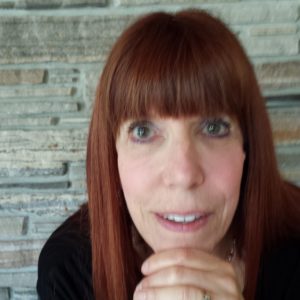 Teacher, learner, and advocate for the arts, equity, literacy, and social justice, Judith Doan is a Dramatic Arts and English teacher who is an ardent supporter of public education. With a colleague, she is currently researching the history of dance education in Ontario public schools for Dance Collection Danse as an adjunct to their dance archives. She is a past president of the Council of Ontario Drama and Dance Educators: CODE, and is an active member of their advocacy committee.
Teacher, learner, and advocate for the arts, equity, literacy, and social justice, Judith Doan is a Dramatic Arts and English teacher who is an ardent supporter of public education. With a colleague, she is currently researching the history of dance education in Ontario public schools for Dance Collection Danse as an adjunct to their dance archives. She is a past president of the Council of Ontario Drama and Dance Educators: CODE, and is an active member of their advocacy committee.
Judith on public education:
“Two quotes continue to resonate for me:
‘In a completely rational society, the best of us would aspire to be teachers and the rest of us would have to settle for something less, because passing civilization along from one generation to the next ought to be the highest honour and the highest responsibility anyone could have.’ – Lee Iacocca
At a CODE brainstorming session a group of teachers came up with the following statement:
‘Teaching is a never-ending dance to engage students thoughtfully and reflectively in the drama of life-long learning, to challenge them to listen to the music created within their souls as they visualize the art of possibilities for themselves and the world.’ “
Twitter: @judithdoan1
Debbie Nyman
 Debbie is a Faculty Advisor in the Master of Teaching program and an instructor of Dramatic Arts Additional Qualifications at OISE/UT. She was a classroom teacher and instructional leader with the Toronto District School Board. Debbie has written curriculum documents and resources for the Toronto District School Board and the Ministry of Education and is the co-author of Drama Schemes, Themes, and Dreams (Pembroke Publishing) and Truth in Play:Drama Strategies for Building Meaningful Performances (Playwrights Canada Press). Currently Debbie is a member of the Advocacy Committee at the Council of Drama and Dance in Education.
Debbie is a Faculty Advisor in the Master of Teaching program and an instructor of Dramatic Arts Additional Qualifications at OISE/UT. She was a classroom teacher and instructional leader with the Toronto District School Board. Debbie has written curriculum documents and resources for the Toronto District School Board and the Ministry of Education and is the co-author of Drama Schemes, Themes, and Dreams (Pembroke Publishing) and Truth in Play:Drama Strategies for Building Meaningful Performances (Playwrights Canada Press). Currently Debbie is a member of the Advocacy Committee at the Council of Drama and Dance in Education.
Debbie on public education:
I strongly believe in the power of the collective to inspire, motivate, generate ideas and encourage deeper thinking in the students and teacher. The collective in the public school system includes children and teachers from a variety of backgrounds, cultures, creating a rich and diverse group of voices from which to learn about the world. I also believe in the community school to bring together children with differing strengths and interests to allow for a variety of strong programs including the arts, technology, sciences and maths. A strong public community school educates the whole child and connects and strengthens all members of the community.
Twitter: @nymandeb
Mary Reid
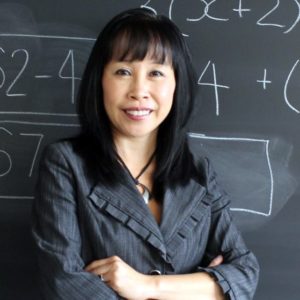 Dr. Mary Reid is an Assistant Professor in math education at University of Toronto’s Ontario Institute for Studies in Education (OISE). She brings extensive field experience to her academic role as a former classroom teacher, instructional leader, education officer at the Education Quality Accountability Office (EQAO), vice-principal, and principal. Mary is the proud recipient of OISE’s 2018 Teaching Excellence Award for Excellence in Initial Teacher Education. Teaching prospective teachers is the centerpiece of her work. Her research publications include studies about the math content knowledge of elementary pre-service teachers, math anxiety in the classroom, the gender gap in STEM, and building efficacy for math teaching. Mary was recently awarded a Social Sciences and Humanities Research Council (SSHRC) grant, to conduct research on how math content knowledge impacts pre-service teachers’ math knowledge for teaching. Her research and findings would be of interest to those seeking to enhance math teacher education through building math capacities of pre-service and in-service teachers.
Dr. Mary Reid is an Assistant Professor in math education at University of Toronto’s Ontario Institute for Studies in Education (OISE). She brings extensive field experience to her academic role as a former classroom teacher, instructional leader, education officer at the Education Quality Accountability Office (EQAO), vice-principal, and principal. Mary is the proud recipient of OISE’s 2018 Teaching Excellence Award for Excellence in Initial Teacher Education. Teaching prospective teachers is the centerpiece of her work. Her research publications include studies about the math content knowledge of elementary pre-service teachers, math anxiety in the classroom, the gender gap in STEM, and building efficacy for math teaching. Mary was recently awarded a Social Sciences and Humanities Research Council (SSHRC) grant, to conduct research on how math content knowledge impacts pre-service teachers’ math knowledge for teaching. Her research and findings would be of interest to those seeking to enhance math teacher education through building math capacities of pre-service and in-service teachers.
Mary on public education:
“My father used to say to me when I was little, ‘no one can take your education away, so make sure you get a good one.’ As an immigrant child who spoke limited English in the early 1970s, my parents valued the role of public education because it was the key to a better life and better future for their children. The public education system not only supported my academic growth, but it also nurtured my social emotional well-being and taught me the value of diversity and inclusivity. Today I am deeply honoured to be part of the public education sector as a university professor who teaches prospective teachers. There is no other profession that directly impacts students’ lives more than teaching in public education.”
Twitter: @drmaryreid
Mason Black
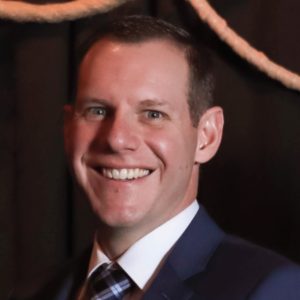 Mason is a secondary school teacher, teaching mathematics and computer science in Smiths Falls, Ontario. Over the past few years, his students have worked on major national and international projects in a cross-curricular approach to help honour Canadian soldiers that sacrificed their lives in one of Canada’s two most significant historical battles: the Battle of Vimy Ridge, and the D-Day Landings at Juno Beach in Normandy, France. The students that participated in these projects were rewarded the Lieutenant Governor’s Heritage Award, based on their dedication for helping to revisit, preserve and rewrite Canada’s history with an innovative approach by developing mobile applications. After recently completing his Master’s of Education, Mason is working on a new project with his students to develop a new iPhone app to interactively identify the significance of the Rideau Canal waterway that connects Kingston to Ottawa. Additionally, Mason is in the process of developing a course based around computer programming in Minecraft, to help make coding more accessible for students of all ages and ability levels. Mason completed his post secondary education in Chicago after receiving a hockey scholarship, and is active in coaching a variety of sports in school and the greater community. He is also an active participant in the emerging field of hockey analytics – integrating mathematics and computer science with big data.
Mason is a secondary school teacher, teaching mathematics and computer science in Smiths Falls, Ontario. Over the past few years, his students have worked on major national and international projects in a cross-curricular approach to help honour Canadian soldiers that sacrificed their lives in one of Canada’s two most significant historical battles: the Battle of Vimy Ridge, and the D-Day Landings at Juno Beach in Normandy, France. The students that participated in these projects were rewarded the Lieutenant Governor’s Heritage Award, based on their dedication for helping to revisit, preserve and rewrite Canada’s history with an innovative approach by developing mobile applications. After recently completing his Master’s of Education, Mason is working on a new project with his students to develop a new iPhone app to interactively identify the significance of the Rideau Canal waterway that connects Kingston to Ottawa. Additionally, Mason is in the process of developing a course based around computer programming in Minecraft, to help make coding more accessible for students of all ages and ability levels. Mason completed his post secondary education in Chicago after receiving a hockey scholarship, and is active in coaching a variety of sports in school and the greater community. He is also an active participant in the emerging field of hockey analytics – integrating mathematics and computer science with big data.
Mason on public education:
“I was extremely fortunate to have completed my formative education in Ontario’s public school system, which has more than prepared me for the rigours of higher education. I feel that it is my responsibility to acknowledge my privilege and give back by helping students to become globally aware and active citizens in creating a better world.”
Website: www.lest-we-forget.ca
Session PM5: Towards a new vision for special education
Louise Sirisko
Louise Sirisko joined York Region District School Board (YRDSB) as Director of Education in January 2018. She brings a wealth of experience and knowledge to the role, including direct experience with another large school board in the province and with the Ministry of Education. Ms. Sirisko demonstrates a strong commitment to to equity, inclusion, and human rights. She has a proven track record of building positive relationships with students, families, staff, and community members to advance student achievement and well-being. Previous to her appointment as Director at YRDSB, Ms. Sirisko spent 27 years in education, including as the Director of the Special Education/Success for All Branch at the Ministry of Education. She began her career as an elementary school teacher, and has held other positions, including principal, superintendent of education, and superintendent of special education.
Louise on public education:
“In public education, we have the ability to make a difference in the trajectory of students’ lives. We want every student to achieve their personal excellence, and feel prepared to be successful in the future. That also means valuing students’ well-being, mental health, citizenship, and empathy. All students and their pathways matter.”
Website: www.yrdsb.on.ca
Twitter: @YRDSBDirector
Kate Diakiw
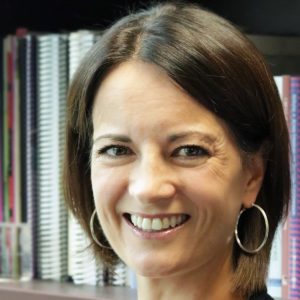 Kate started teaching in York Region District School Board in 1995. After teaching for several years in a regular classroom setting, she obtained her Special Education Specialist and became a Special Education Resource Teacher. Since 2003, she has been a vice-principal, principal, and regional principal of special education. In 2016, she was appointed Superintendent of Student Services in YRDSB. Kate is deeply committed to equity and inclusivity, and she works to ensure that every child has equal opportunities to reach their full potential.
Kate started teaching in York Region District School Board in 1995. After teaching for several years in a regular classroom setting, she obtained her Special Education Specialist and became a Special Education Resource Teacher. Since 2003, she has been a vice-principal, principal, and regional principal of special education. In 2016, she was appointed Superintendent of Student Services in YRDSB. Kate is deeply committed to equity and inclusivity, and she works to ensure that every child has equal opportunities to reach their full potential.

